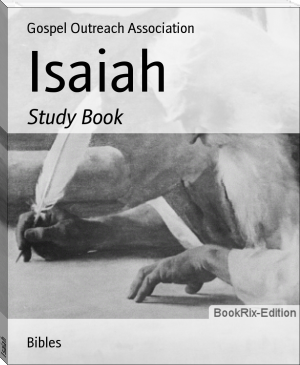Author's e-books - Isaiah. Page - 1

These chapters are a continuation of "Comfort Ye My People." They represent a bank of promises that clearly are some of the greatest in the Old Testament. These verses are directed to all Israel, not just the Southern Kingdom. They are given primarily to a people who have become unfamiliar with the intimate love God has for them.

Everything seems to be "up for grabs" as economies struggle to cope with debt and extremism. (Threats that have never been seen before in history (because of the scale of the capabilities for assault on a nation or a people) plus a populous which is growing more dependent on large national programs as opposed to personal initiative.) Great struggles exist from the encroachment of government into private lives and into every arena of social posturing from education, to religion, to family life.

The use of an "over-theme" is difficult to describe, but this is the method God used in these six chapters. The "over-theme" in chapters 21-23 is a positive assurance to His people, that no matter what is going on around them---there is an end to it! They can be assured that "through it all" there is a forthcoming victory. The "over-theme" in chapters 24-27 is in the form of multiple Songs. The righteous, the redeemed of the Lord, are heard singing above the tragic events of history. Above the clashing swords, above the bloody ground and cries and groans of men, there rises praise to God.

We will steer our study over four chapters reviewing several of the enemies of Israel. Beginning with Babylon in Chapter 13, it is necessary to point out, not only the accuracy of the Prophet, but the long timeline. (Sometimes the prophet reaches into the future for over 100 years and is "on the money" historically. This prompts biblical critics to declare there are many Isaiah writers who voice their work in this book. Don't believe them.)

Isaiah is the great "Re-introducer of God." In profound language, both in prose and poetry, he addresses a nation that had "forgotten with Whom they were dealing." In today's study of the first five chapters, there builds a crescendo of interaction between God and His people that will culminate in the wonderful sixth chapter.

It is easy to forget, in these closing chapters of Isaiah, that God is re-introducing Himself to His people. Along with these passages is an ever increasing refinement of what He considers as important and just how He plans to intervene in history. The Lord shows the tender side of His Fatherhood, as well as, the power side of His authority.

These chapters are a continuation of "Comfort Ye My People." They represent a bank of promises that clearly are some of the greatest in the Old Testament. These verses are directed to all Israel, not just the Southern Kingdom. They are given primarily to a people who have become unfamiliar with the intimate love God has for them.

Everything seems to be "up for grabs" as economies struggle to cope with debt and extremism. (Threats that have never been seen before in history (because of the scale of the capabilities for assault on a nation or a people) plus a populous which is growing more dependent on large national programs as opposed to personal initiative.) Great struggles exist from the encroachment of government into private lives and into every arena of social posturing from education, to religion, to family life.

The use of an "over-theme" is difficult to describe, but this is the method God used in these six chapters. The "over-theme" in chapters 21-23 is a positive assurance to His people, that no matter what is going on around them---there is an end to it! They can be assured that "through it all" there is a forthcoming victory. The "over-theme" in chapters 24-27 is in the form of multiple Songs. The righteous, the redeemed of the Lord, are heard singing above the tragic events of history. Above the clashing swords, above the bloody ground and cries and groans of men, there rises praise to God.

We will steer our study over four chapters reviewing several of the enemies of Israel. Beginning with Babylon in Chapter 13, it is necessary to point out, not only the accuracy of the Prophet, but the long timeline. (Sometimes the prophet reaches into the future for over 100 years and is "on the money" historically. This prompts biblical critics to declare there are many Isaiah writers who voice their work in this book. Don't believe them.)

Isaiah is the great "Re-introducer of God." In profound language, both in prose and poetry, he addresses a nation that had "forgotten with Whom they were dealing." In today's study of the first five chapters, there builds a crescendo of interaction between God and His people that will culminate in the wonderful sixth chapter.

It is easy to forget, in these closing chapters of Isaiah, that God is re-introducing Himself to His people. Along with these passages is an ever increasing refinement of what He considers as important and just how He plans to intervene in history. The Lord shows the tender side of His Fatherhood, as well as, the power side of His authority.



